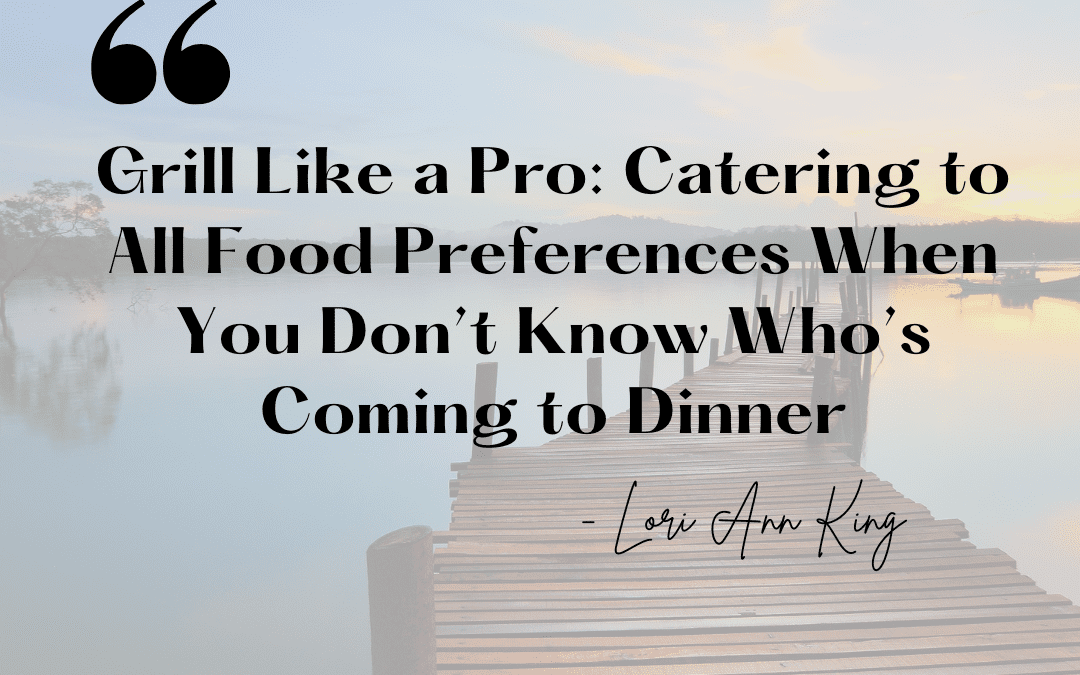May and June are a time to celebrate weddings, graduations, Mother’s Day, Memorial Day, or Father’s Day. Mastering the grill for an eclectic crowd is easier than you may think.
Planning a food-related gathering is not always easy, especially if you don’t know everyone’s food preferences and lifestyles. One guest may be following a keto lifestyle, while another is vegan. As someone who tries to live a gluten-free life, I have had my share of anxiety about how to navigate meals out. But these gatherings are all about community and belonging. They’re about connecting and building or nurturing relationships.
Whether you are a guest or the host, food-related gatherings can be a space for curiosity, instead of anxiety.
If You Are the Host of a Spring Gathering
As the host, you can offer a variety of proteins, veggies, and breads that can be prepared ahead of time, and cooked on the grill.
- Proteins: You can’t go wrong with offerring a variety of animal proteins, including chicken, steak, sausage, or fish. This will keep your athletes and carnivores happy and works for both the keto, paleo, and gluten-free lifestyles.
- Veggies: Roasted vegetables are my favorite way to eat my veggies! Your options are endless: zucchini, yellow squash, mushrooms, asparagus, corn on the cob, peppers, eggplant, onion, and garlic are just a few ideas. Don’t forget the potatoes! Chopped into smaller sizes, they grill up fast and will keep your guests satiated. This variety of vegetables will keep your plant-based, vegan, and vegetarian content, and the potatoes are a nice hearty side for meat lovers, too.
- Breads: While your gluten-free guests will say no thank you to any breads and rolls you serve, others will appreciate the carbs to help fill them up. Baguettes, sandwich rolls, or Texas toast can be a great filler.
- Fruit Desserts: Peaches, melons, pineapple, pears, tomatoes, and bananas taste wonderful on the grill and even hold their shape. They are a nice light way to finish off a great meal and fit into a variety of diets, preferences and lifestyles.
Communication is vital to a successful spring gathering involving food, so it can’t hurt to ask your guests if they have any particular food sensitivities, allergies, or needs. Live in your curiosity. Ask them how you can collaborate for a great experience.
I have a friend who is celiac, diabetic, and has an auto-immune disease. While I’d like to be able to offer her food she can eat, she knows herself best, and how to get the nutrients she needs while keeping herself safe. I know it is sometimes easier – and safer – for her to bring her own food. And as the host, I am not offended by this.
People are sensitive about their food needs and preferences and are not for the host to debate. Grilling their protein and vegetables on tin foil while separate from the bread and rolls may be enough to prevent cross-contamination for someone who is gluten-free. But for someone who is celiac, they may need to skip the grill altogether. Just because they bring their own food doesn’t mean they can’t feel included in your gathering.
If someone follows a diet or lifestyle you’re not familiar with, again, live in your curiosity and ask them to bring their favorite dish to share. We can all learn from each other, and who knows, you may even enjoy their food or diet of choice!
If You Are the GUEST at a Spring Gathering
As guests, it is common to fall into the people-pleaser mode. Culturally, many of us have been taught that it is rude not to accept food when it is offered. But as someone who has developed food sensitivities and allergies later in life, making someone else happy at the sacrifice of my health is not a good habit to create or sustain. And what if it’s not a food sensitivity or allergy? What if you simply have a particular food or dietary preference? You shouldn’t have to sacrifice your needs, goals, or choices to make someone else happy by eating their food. Remember, the gathering is all about relationships, community, and connecting.
Communication is critical. When you receive an invite, call the host. You can say something like, “I’m curious. What are you planning to serve? I have a food sensitivity, and I just want to have a conversation ahead of time to manage expectations and keep myself safe.”
Or perhaps you have some health and wellness goals and don’t want to sabotage yourself at a cookout. You could say, “I just want to let you know I’m working to improve my health this year. It’s important to me because I want to be around for my spouse/children/grandchildren for a long time. Please don’t be offended if I skip your homemade bread or dessert.”
Once you learn what the host is serving, you can decide if it fits into your diet or lifestyle. If it doesn’t, don’t feel the need to decline the invite. Offer to bring a dish that meets your needs and complements the host’s menu.
Focus on What’s Important
Overall, remember that spring gatherings are all about celebration and connection. They’re about bringing family and friends together. By living in your curiosity and creating an environment of inclusivity, everyone will feel safe and leave well-fed!
©2024 Lori Ann King
Additional Reading:
From my blog:
Love what you’re reading? For just $1 a month, you can help me cover my costs and keep the words coming! Contribute now.


